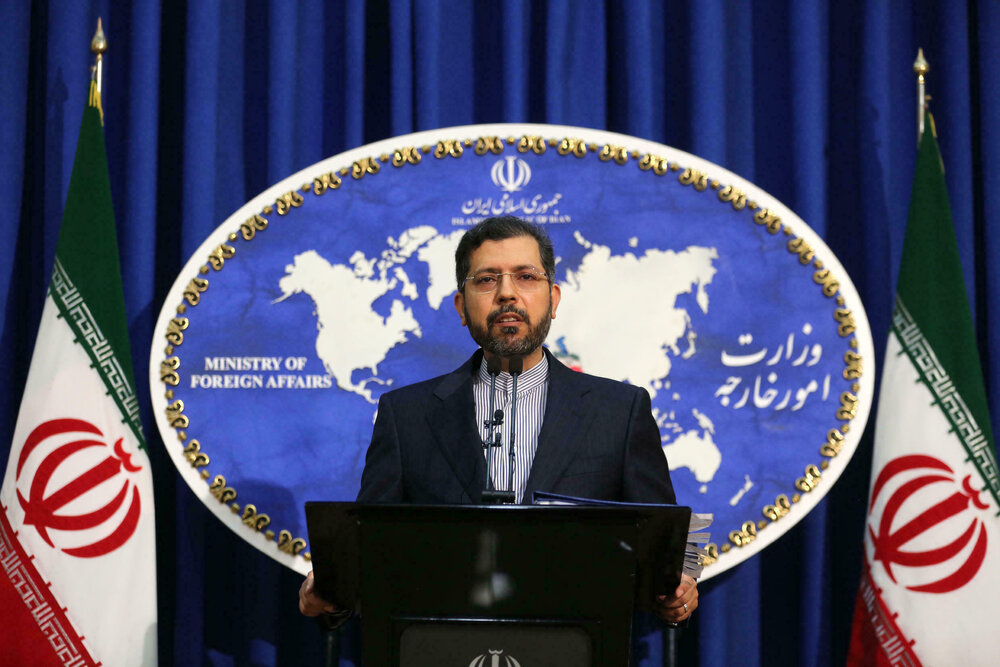Iran rejects reports of draft deal in Vienna as ‘misinformation’

TEHRAN – Iranian Foreign Ministry spokesman Saeed Khatibzadeh has reacted to reports of a draft agreement at the Vienna talks that allegedly lays out phases of mutual steps to bring Iran and the U.S. back into full compliance with a 2015 nuclear deal.
Tehran described the report published by Reuters on a final draft agreement in Vienna as inaccurate and misleading, denying what was reported about reaching a final version of the nuclear agreement to be implemented in stages.
Khatibzadeh said on Twitter that spreading false information in the context of media reports is “dangerous”, adding that the final agreement that allows the United States to return to the nuclear agreement is completely different from the distorted and unfounded report.
“Misinformation disguised as reporting is dangerous. The final deal to let the US return to the JCPOA will be far from the unsourced spin making the rounds. It won't be a bilateral agreement either,” the spokesman said on Twitter.
He added, “Expect more spin as we approach final days.”
The Reuters report was also rebuffed by the Russian envoy to the Vienna negotiations, Mikhail Ulyanov, who said the opponents of the 2015 Iran deal are trying to create an unhealthy environment surrounding the final stage. He added that America was the one that left the agreement in the beginning and now it must take the first step, according to Al Alam.
“As we are getting closer to an agreement on restoration of #JCPOA, the opponents of the nuclear deal are becoming more and more proactive in the public space trying to create unhealthy atmosphere around final stage of the #ViennaTalks,” the Russian diplomat said on Twitter.
Reuters has indicated in its report that the first steps unfreezing Iranian assets and releasing prisoners, while the cancellation of the main sanctions will be dealt with later. It also pointed out that the draft agreement stipulates that Iran freezes enrichment activities above 5 percent.
Reuters, citing diplomats, claimed that “a U.S.-Iranian deal taking shape to revive Iran's 2015 nuclear agreement with world powers lays out phases of mutual steps to bring both sides back into full compliance, and the first does not include waivers on oil sanctions.”
It added, “The draft text of the agreement, which is more than 20 pages long, stipulates a sequence of steps to be implemented once it has been approved by the remaining parties to the deal, starting with a phase including Iran suspending enrichment above 5% purity.”
The report comes at a time when the date of reaching an agreement between Iran and the West is imminent, according to the consensus among the majority of the negotiating parties. Washington has talked about making significant progress in the Vienna talks during the past week, and considered that the possibility of concluding an agreement is possible “within days” if Tehran shows seriousness.
Paris, for its part, considered that the agreement is now a few steps away, and that there are only days left for a decision on it, while China confirmed that the talks are in their last stage.
The chief Iranian negotiator, Ali Bagheri Kani, had confirmed that reaching an agreement is closer than ever, but he stressed that a deal will be dependent on agreeing on all issues. He called on the West to take serious decisions.
“After weeks of intensive talks, we are closer than ever to an agreement; nothing is agreed until everything is agreed, though. Our negotiating partners need to be realistic, avoid intransigence and heed lessons of past 4yrs. Time for their serious decisions,” the Iranian negotiator said on Twitter.
Earlier, Khatibzadeh had to offer explanation about a visit by an Iranian delegation to South Korea.
In response to a question by journalists regarding media reports about an Iranian delegation’s visit to South Korea, Khatibzadeh said, “An expert delegation from the Islamic Republic of Iran consisting of banking and oil experts held talks in Seoul this week with South Korean officials and companies.”
He said the talks aimed to look into the possibility of resuming exports of Iranian oil and gas condensate to South Korea.
Khatibzadeh added that the visit happened in line with Iran’s policy to develop relations with Asian countries in a balanced way and after the deputy foreign ministers of Iran and South Korea met in Vienna.
He reiterated that the Iranian side used this opportunity, in consultation with the South Korean officials, to underline the need to lift the illegal freezing of Iran's assets in South Korea.
The Iranian Foreign Ministry spokesman noted that the results of the expert meeting could serve as a test of South Korea's seriousness and determination to resolve the two countries' differences and restore the relations to normal, including by selling oil and gas condensate to South Korea and investment by South Korean companies in Iran’s economic projects.
Khatibzadeh stressed that for this reason, the Islamic Republic of Iran will carefully follow the results of these negotiations and will take those results into account while regulating relations between Tehran and Seoul.
Leave a Comment